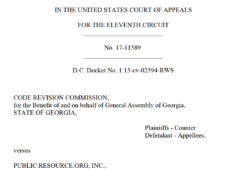Michael Carroll sends this worthy request, for a small piece of activism that anyone (13+ years old) reading this can help with:
After years of work on promoting policy change to make federally-funded research available on the Internet, and after winning the battle to implement a public access policy at NIH, it has become clear that being on the right side of the issue is necessary but not sufficient. We’ve had the meetings, done the hearings, replied to the requests for information.
But we’re opposed in our work by a small set of publishers who profit enormously from the existing system, even though there is no evidence that the NIH policy has had any measurable impact on their business models. They can – and do – outspend those of us who have chosen to make a huge part of our daily work the expansion of access to knowledge. This puts the idea of access at a disadvantage. We know there is a serious debate about the extension of public access to taxpayer funded research going on right now in the White House, but we also know that we need more than our current approaches to get that extension made into federal policy.
The best approach that we have yet to try is to make a broad public appeal for support, straight to the people. The Obama Administration has created a web platform to petition the White House directly called We The People. Any petition receiving more than 25,000 digital signatures is placed on the desk of the President’s Chief of Staff and must be integrated into policy and political discussions. But there’s a catch – a petition only has 30 days to gather the required number of signatures to qualify.
We can get 25,000 signatures. And if we not only get 25,000, but an order of magnitude more, we can change the debate happening right now.
Here’s the text of the petition (complying with an 800 word cap):
WE PETITION THE OBAMA ADMINISTRATION TO:
Require free, timely access over the Internet to journal articles arising from taxpayer-funded research.
We believe in the power of the Internet to foster innovation, research, and education. Requiring the published results of taxpayer-funded research to be posted on the Internet in human and machine readable form would provide access to patients and caregivers, students and their teachers, researchers, entrepreneurs, and other taxpayers who paid for the research. Expanding access would speed the research process and increase the return on our investment in scientific research.
The highly successful Public Access Policy of the National Institutes of Health proves that this can be done without disrupting the research process, and we urge President Obama to act now to implement open access policies for all federal agencies that fund scientific research.
To sign the petition you:
Looks like a good cause to me. The petition will be open for signature for 30 days, but don’t delay — you might forget.

